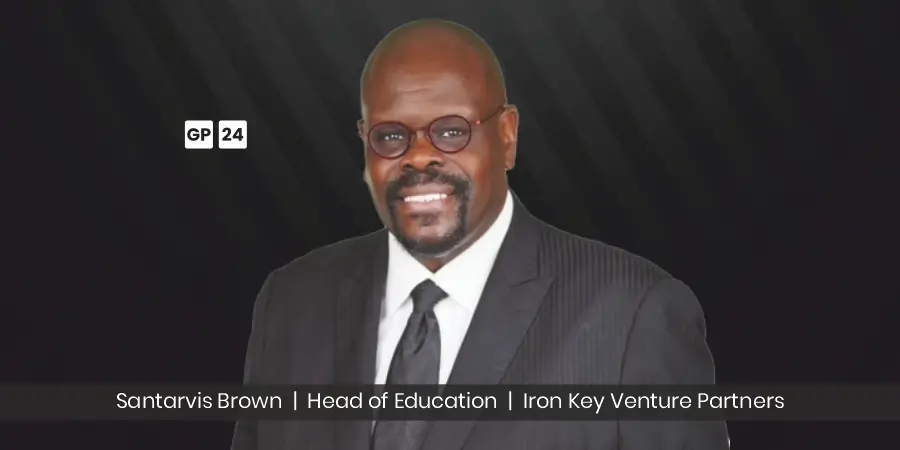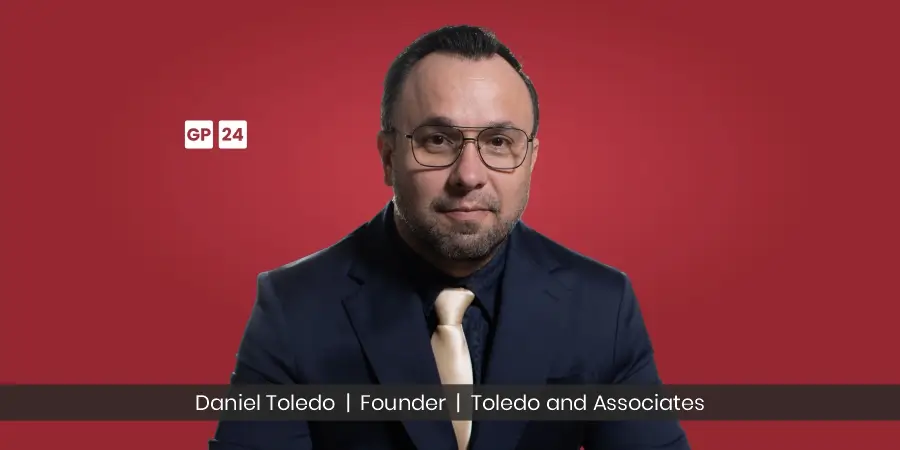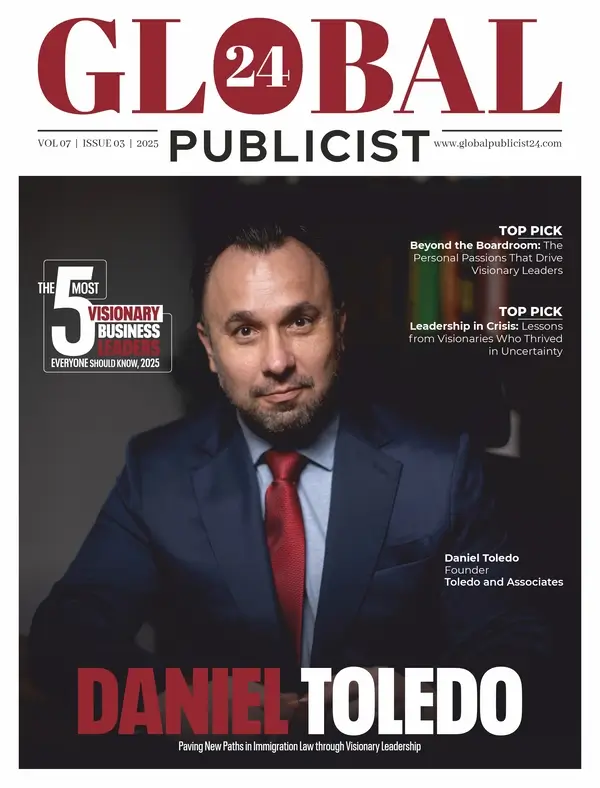“Lead with purpose. Build with vision. Elevate everyone at the table.”
In the mid-1900s, Maria Montessori defied traditional systems of instruction by proposing that children could lead their own learning through exploration, not force-fed information. Her radical ideas, first dismissed by the mainstream, went on to revolutionize early childhood education globally. Like Montessori, disruptors in education have always carried a flame—one that burns not for recognition, but for radical inclusion, fearless reform, and bold possibility.
Today, that flame is carried forward by Dr. Santarvis Brown, a scholar, strategist, and servant leader who has made it his life’s mission to reshape education as a force of liberation. As Head of Education at Iron Key Venture Partners and founder of The Equity & Elevation Collective™, Dr. Brown is designing the future of education. Through roles that span classrooms and boardrooms, he has become a voice of transformation in a field that too often resists change.
This is the story of a leader whose life’s work proves that justice-driven education is inevitable.
A Journey Rooted in Purpose
Dr. Brown’s journey into education leadership has never been just about credentials—it’s been about calling. He started as a middle school teacher in a system that overlooked too many and invested in too few. He saw children brimming with brilliance navigating structures not built for their success.
That’s when he knew: he couldn’t just teach inside the system, he had to help change it. His career evolved through every role he held—teacher, administrator, professor, consultant, and executive. With each step, he carried one central belief: that leadership should not be about control, but about liberation. Today, he leads as a scholar, strategist, and servant, committed to transforming education into a space where all people—regardless of race, background, or zip code—can thrive and lead.
Leading With Soul and Strategy
At his core, Dr. Brown is an educator who believes that learning is sacred and that equity is non-negotiable. He doesn’t simply work in education—he lives it as a calling. He believes that education should break chains, not reinforce them. He leads from a place of purpose, truth, and deep compassion for those who have been silenced or sidelined. This belief is embedded in everything he does.
As Head of Education at Iron Key Venture Partners, he brings that same fire to the systems he helps design. He envisions learning environments that are inclusive, sustainable, and rooted in justice. The focus is on building scalable solutions that empower institutions—universities, edtech companies, nonprofits—to merge innovation with inclusion. For him, it’s never just about metrics—it’s about meaning. It’s about ensuring that every investment in education becomes a pathway to freedom, dignity, and transformation for those who have historically been left behind.
What Makes a Visionary Leader?
A visionary education leader in this era, according to Dr. Brown, is not someone with the loudest voice or the longest résumé—but someone with the courage to reimagine the world as it could be. Visionary leaders listen deeply, act boldly, and lead with humility. They embrace discomfort, challenge the status quo, and lead from a place of both strategy and soul.
In a time defined by uncertainty, AI disruption, and growing inequality, true visionaries are those who hold space for both innovation and compassion, who see education not just as a system to reform, but a sacred tool to repair and rebuild.
Bridging Technology and Humanity
Dr. Brown believes that the future of education is being shaped by a convergence of major forces: the rise of artificial intelligence, the growth of micro-credentials and on-demand learning, the urgency of closing equity gaps, and the redefinition of student success.
At The Equity & Elevation Collective™, the consulting firm Dr. Brown founded, they’re leaning into this future—not just with technology, but with humanity. They help institutions integrate tools that enhance, not replace, the human connection. They advise on policy, accreditation, and strategic innovation to ensure leaders are not reacting to change—they’re driving it. And they support marginalized voices to lead these transformations, because any future not shaped by equity is a future incomplete.
For Dr. Brown, technology is a bridge and not a substitute. He ensures that every digital tool adopted, every platform built, is rooted in real human need. That means asking hard questions: Does this tool create access or widen the gap? Does it help educators become more responsive or simply automate the status quo?
At Iron Key and through The Equity & Elevation Collective™, they create tech-enabled solutions that prioritize empathy, personalization, and dignity. Their model is guided by the belief that innovation must serve people, not the other way around.
Turning Resistance into Movement
Dr. Brown is of the opinion that Real change begins with shared trust—and radical empathy. Resistance to change is always the greatest challenge, especially when people are comfortable with outdated systems that no longer serve our collective future.
One challenging moment that stands out to Dr. Brown was launching a multi-campus leadership development program during the height of the pandemic. Institutions were in survival mode, and trust in change was low.
He leaned into radical empathy, met stakeholders where they were, and co-designed a flexible, hybrid model that honored both tradition and transformation. The outcome was deeper engagement, wider access, and a new sense of what’s possible. He’s learned that the key to overcoming resistance is not force, but shared vision and trust.
Designing for Belonging
One of the most impactful collaborations for Dr. Brown was the creation of a Leadership Fellowship for first-generation and underrepresented graduate students across multiple universities. It wasn’t just a program—it was a movement. They built a curriculum rooted in identity, resilience, and systems thinking. The fellowship included mentorship, policy training, and real-world leadership experiences.
The results were transformative. Not only did they see improved academic outcomes, but fellows also went on to serve as institutional changemakers in their respective sectors. That initiative reminded him of the power of designing for belonging, and what can happen when students see themselves as leaders—not someday, but right now.
Words to Lead By
Dr. Brown remains a student first. He reads voraciously, engages with international thought leaders, and surrounds himself with voices that challenge his thinking. Teaching graduate students also keeps him sharp—they are curious, bold, and constantly push boundaries. He also participates in civic boards, faith-based initiatives, and cross-sector coalitions, which give him a front-row seat to the real needs on the ground. Growth, for him, is not a phase, it’s a posture.
When asked what advice he’d give to the upcoming education professionals aspiring to make an impact, Dr. Brown’s advice is clear: Don’t wait for a title to lead. The moment you choose to serve with integrity, you are already a leader. Lead with heart, not just with hustle. Stay grounded in your “why,” and remember that impact isn’t about visibility—it’s about value. Find your people. Build community. Rest when needed but never quit. And above all, never underestimate the power of a single voice, a bold idea, or a compassionate act to change the course of a life, or a system.
Cultivating a Global Movement
Dr. Brown describes his journey as a tapestry of faith, failure, and fierce hope. Every setback, every win, every turning point has reaffirmed one truth: when you lead from love and fight for justice, your work will never be in vain. He doesn’t just want to be known as an education leader; he wants to be remembered as someone who made people feel seen, empowered, and equipped to lead themselves.
Over the next decade, Dr. Brown plans to scale The Equity & Elevation Collective™ into a global hub for justice-centered leadership. He envisions launching an international equity and innovation fellowship, a digital learning academy, and a policy lab dedicated to dismantling systemic barriers.
He will continue writing, speaking, and building frameworks that empower communities around the world. His role will shift from implementer to ecosystem builder—from leading projects to cultivating movements. But no matter the scale, his purpose will stay the same: to educate, to elevate, and to equip others to rise.














